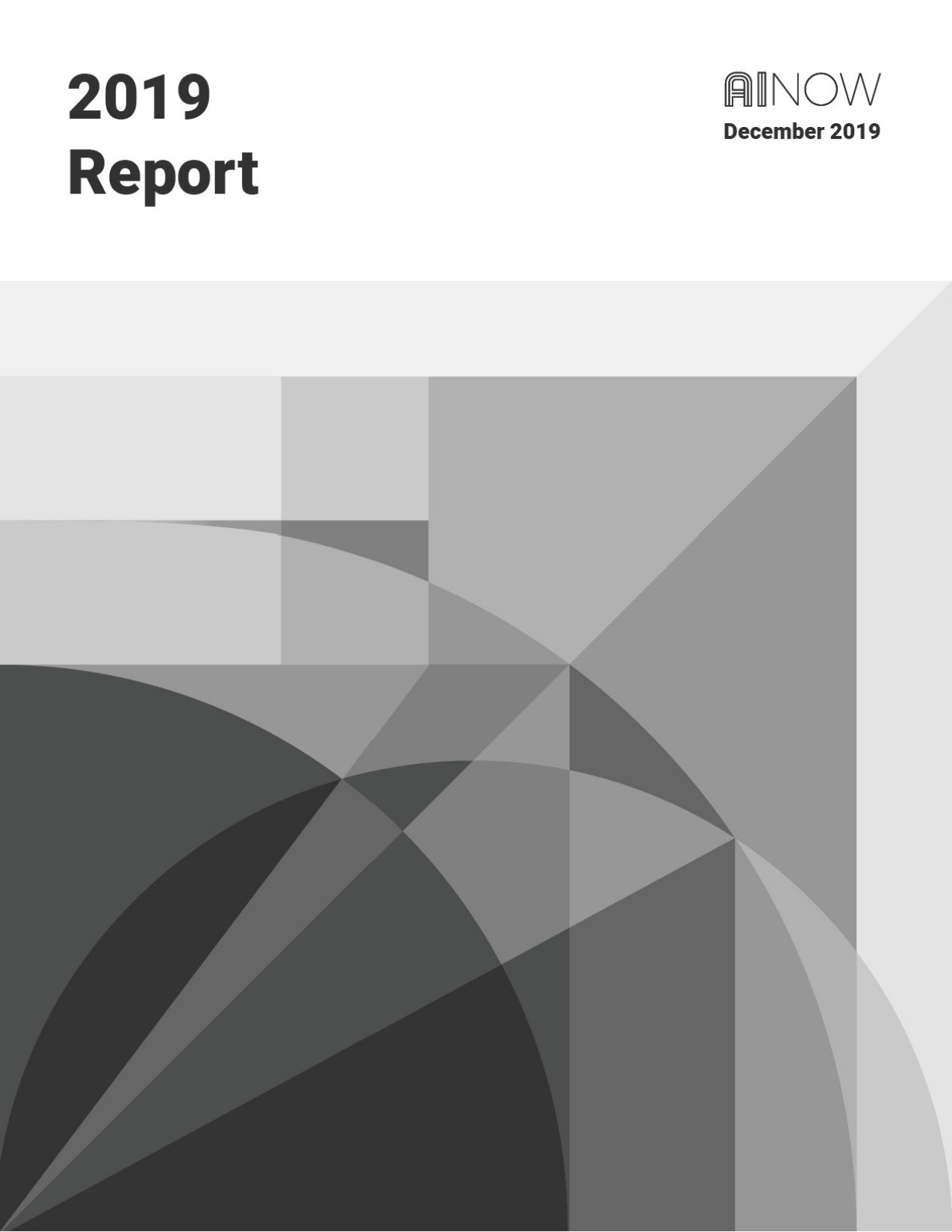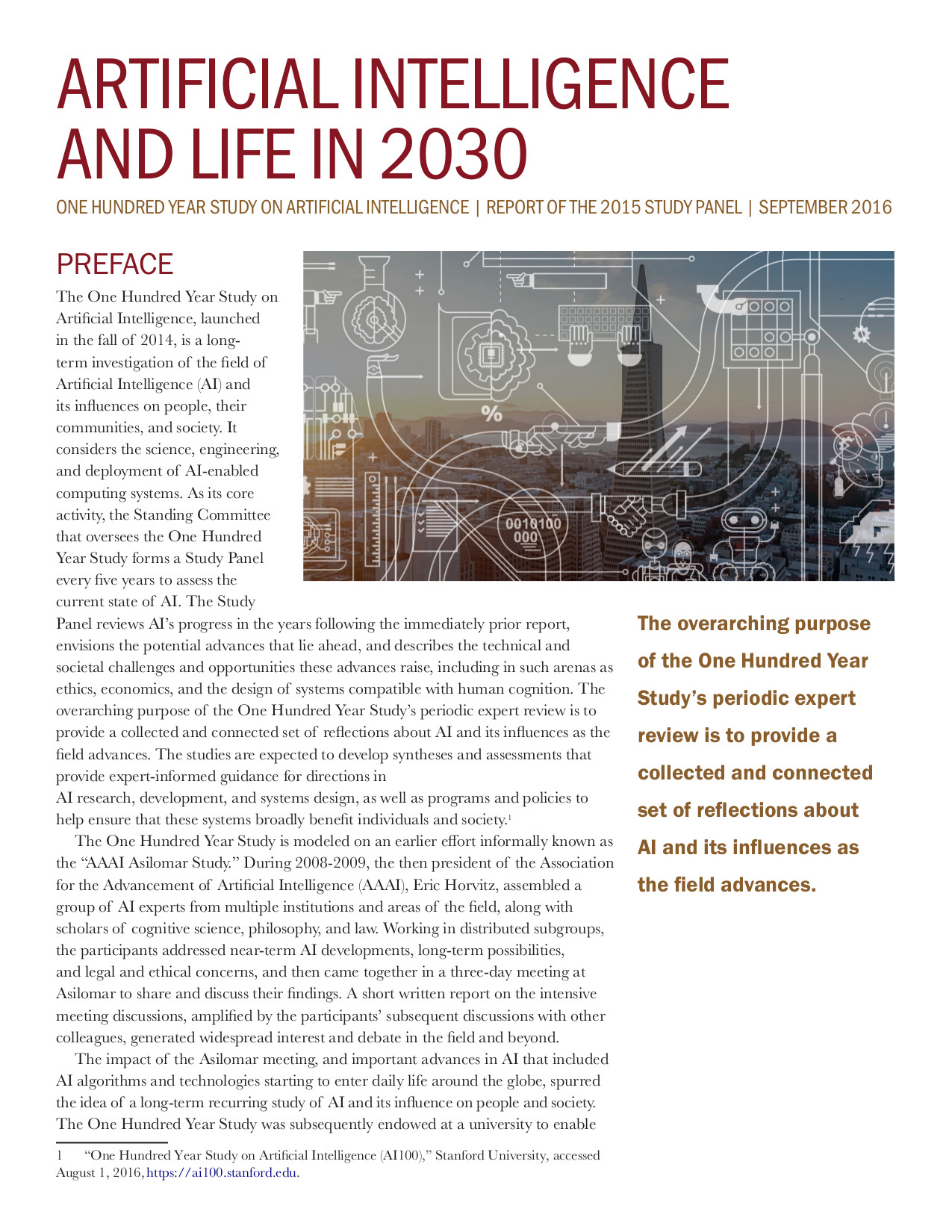AI Now 2019 Report (2019)
Filed under report | Tags: · artificial intelligence, automation, data, employment, ethics, gender, governance, infrastructure, machine learning, policy, power, race, society

This report “examines new research on the risks and harms of AI, including its use by companies to aggressively manage and control workers, its climate impact, and the growing use of facial and affect recognition. We also look at the growing movements that are demanding a halt to risky and dangerous AI, and offer recommendations on what policymakers, advocates, and researchers can do to address these harms.”
By Kate Crawford, Roel Dobbe, Theodora Dryer, Genevieve Fried, Ben Green, Elizabeth Kaziunas, Amba Kak, Varoon Mathur, Erin McElroy, Andrea Nill Sánchez, Deborah Raji, Joy Lisi Rankin, Rashida Richardson, Jason Schultz, Sarah Myers West, and Meredith Whittaker
Publisher AI Now Institute, New York, 12 Dec 2019
Creative Commons BY-ND 4.0 International License
100 pages
Artificial Intelligence and Life in 2030: One Hundred Year Study on Artificial Intelligence (2016)
Filed under report | Tags: · artificial intelligence, computing, industry, machine learning, society, technology

“The Stanford One Hundred Year Study on Artificial Intelligence, a project that launched in December 2014, is designed to be a century-long periodic assessment of the field of Artificial Intelligence (AI) and its influences on people, their communities, and society. Colloquially referred to as “AI100″, the project issued its first report in September 2016. A Standing Committee works with the Stanford Faculty Director of AI100 in overseeing the project and designing its activities. A little more than two years after the first report appeared, we reflect on the decisions made in shaping it, the process that produced it, its major conclusions, and reactions subsequent to its release.
The inaugural AI100 report, which is titled “Artificial Intelligence and Life in 2030,” examines eight domains of human activity in which AI technologies are already starting to affect urban life. In scope, it encompasses domains with emerging products enabled by AI methods and ones raising concerns about technological impact generated by potential AI – enabled systems. The Study Panel members who authored the report and the AI100 Standing Committee, which is the body that directs the AI100 project, intend for it to act as a catalyst, spurring conversations on how we as a society might shape and share the potentially powerful technologies that AI could enable. In addition to influencing researchers and guiding decisions in industry and governments, the report aims to provide the general public with a scientifically and technologically accurate portrayal of the current state of AI and its potential. It aspires to replace conceptions rooted in science fiction books and movies with a realistic foundation for these deliberations.”
Publisher Stanford University, September 2016
Creative Commons BY-ND 4.0 International License
52 pages
Commentary: Barbara J. Grosz & Peter Stone (Communications of the ACM, 2018).
Comment (0)Intergovernmental Panel on Climate Change: Fifth Assessment Report: The Physical Science Basis (2013)
Filed under report | Tags: · climate crisis, environment, global warming, science

The first of three parts of the Fifth Assessment Report (AR5) focuses on the scientific evidence behind climate change and the human role in it. The Intergovernmental Panel on Climate Change (IPCC) has been meeting in Stockholm this week to discuss the final wording of the summary of Working Group One (WG1), which assesses the physical science, such as concentrations of greenhouse gases in the atmosphere, temperature rises and climate models. It has been written the world’s top climate scientists – 209 lead authors and 50 editors from 39 countries. This summary report will be followed by Working Group I’s full in-depth report on Monday, 30 September.
Set up in 1988, the IPCC is a United Nations body that evaluates the state of climate science. It produces major assessments every five-seven years. The last report, published in Paris in 2007, said that scientists were 90% certain that humans were responsible for global warming. The panel was awarded the Nobel peace prize in the same year, shared jointly with former US vice–president, Al Gore.
Working Group II’s report on Impacts, Adaptation and Vulnerability is scheduled to be released in mid March 2014, followed by Working Group III’s Mitigation of Climate Change in early April 2014. AR5 Synthesis Report (SYR) will be released in October 2014.
AR5 Media Portal
UN_ClimateTalks at Twitter
IPCC at Twitter
IPCC Fifth Assessment Report at Wikipedia
Live coverage by The Guardian (27 September)
Global warming likely to breach 2C threshold, climate scientists conclude (summary by Fiona Harvey for The Guardian)
FAQs answered by Adam Vaughan (The Guardian)
Report summary (28 pp, 2 MB, updated on 2015-2-6)
Full report (1535 pp, 375 MB, updated on 2015-2-6)
Press release (27 September 2013)
Other formats and translations (added on 2015-2-6)

